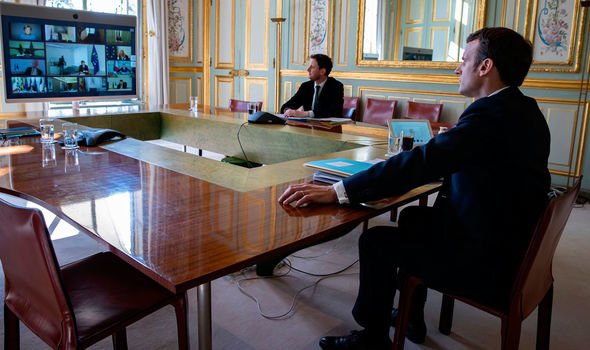EU flunks its rendezvous with history
https://arab.news/yywtb

The tragic classical heroine Cassandra has always held a special place in my heart. The beautiful daughter of King Priam of Troy, she rebuffed the advances of Apollo. In revenge, he visited upon her a terrible destiny: Her powers of analytical prediction would always prove correct, but no one would listen to her.
So, at the pivotal moment of the Trojan War, when the Greek horse bearing its soldiers inside was wheeled through the massive Scaean Gate by the clueless Trojans, Cassandra protested, but was dismissed. That night, the Greeks sacked and pillaged that magical city.
When frustrated, I have often privately thought that Cassandra should be the patron saint of political risk analysis, as good advice not taken is an occupational hazard of the business. But now it seems to me that able French President Emmanuel Macron is the modern political equivalent of the mythical Cassandra, fated to see the world clearly, even as his admonitions are largely, and tragically, ignored.
For, despite his on-the-money analysis of the peril that awaits Europe if it continues to fail to get its act together regarding the coronavirus, not nearly enough is presently happening. The great suspicion must be that the EU as sold to the world — a politically unified great power on the global scene — is, a bit like the Wizard of Oz, so much less than initially meets the eye.
The latest EU “emergency” summit of a fortnight ago, the fourth crisis meeting in just seven weeks, was hailed by Macron himself as a make-or-break moment for the bloc. As I wrote in this column just two weeks ago, beyond the details, the summit would make plain if Europe was ready to have its “Hamilton moment” — to finally and definitively answer the question as to whether it is actually a coherent political union, able to quickly and effectively respond to the coronavirus, the political risk event of the generation. Macron rightly said that Europe had reached the critical moment of its “rendezvous with history.” And then, as has been the case so often in the past, nothing much happened.
For the French president, the key immediate question to answer was whether the EU was prepared to truly share the full burden of the coronavirus crisis across its member states. More specifically, he pinned responsibility for the EU’s ultimate fate on rich northern countries Germany and the Netherlands, urging them to allow (and largely finance) a €1.5 trillion ($1.6 trillion) program of fiscal grants to enable the bloc’s plague-ravaged southern nations to economically rebuild themselves from the ruins of months of putting their already-weak economies into the coma of lockdown. But this proposal, despite the full-throated support of the three most important Southern European powers, was met by little more than an embarrassed silence.
The policy reason for the southerners’ pushing of grants instead of loans is that, rather than loading more unsustainable debt on Spain and Italy, transfers would allow them to recover without visiting dreaded austerity upon the south. Failure to do so, Macron reckons, will merely fuel dangerous levels of anti-EU populism in the south, as Brussels will be seen to have failed the people of Italy and Spain at the moment of greatest crisis, when help was most needed.
Yet the results of the summit were beyond disappointing. The EU issued a much-too-late road map on how its member states ought to exit the lockdown, long after each individual country had already announced their own (largely uncoordinated) plans to do so, often made at the local level.
Secondly, while it was affirmed that common state aid rules will be suspended in the aftermath of the lockdown, only countries with strong fiscal balance sheets will be able to take advantage of this relaxation in order to help national business and their people. It is cold comfort for a debt-oppressed south. The same holds for using government balance sheets to aid Europe’s people in emerging from the crisis: Germany and the Netherlands will be able to do so; France, Italy and Spain, not so much.
It is clear that the EU is not presently capable of creating its own Hamiltonian moment, pulling tighter together politically in order to weather this crisis of crises, for the astute Macron forgot one crucial point. While failing to act would inflame southern populism, acting would animate northern populism.
The great suspicion must be that the EU as sold to the world — a politically unified great power on the global scene — is, a bit like the Wizard of Oz, so much less than initially meets the eye.
Dr. John C. Hulsman
Northern populists would surely ask the painful and strident question as to why they should pay for the debt-strapped south after a decade of southern refusal to enact genuine structural reforms to address the problem. The northern populist refrain would go something like this: “The south didn’t economically fix the roof while the sun was shining, only to come to us in desperation when it’s raining.”
We are left with a situation where the southern political establishment does not think it can survive a populist challenge without a Hamiltonian moment, and the northern political establishment does not think it can survive such a challenge with one. Look for Europe, to the frustration of us all, to continue to be less than meets the eye.
- Dr. John C. Hulsman is the president and managing partner of John C. Hulsman Enterprises, a prominent global political risk consulting firm. He is also senior columnist for City AM, the newspaper of the City of London. He can be contacted via www.chartwellspeakers.com.









































